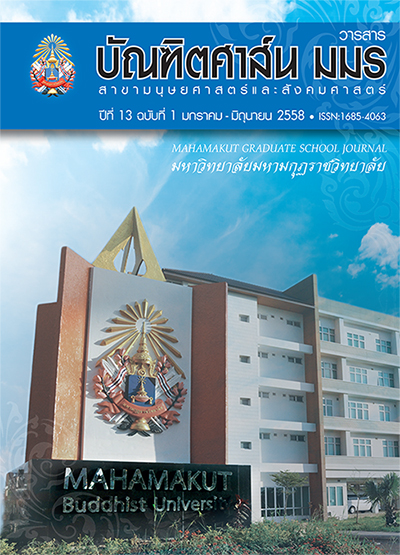การศึกษาเชิงวิเคราะห์การเมืองการปกครอง ที่ปรากฏในคัมภีร์ทศชาติชาดก
บทคัดย่อ
วิทยานิพนธ์นี้มีวัตถุประสงค์เพื่อศึกษาเชิง วิเคราะห์การเมืองการปกครองที่ปรากฏในคัมภีร์ ทศชาติชาดก และนำผลของการศึกษาไปประยุกต์ ในเรื่องการเมืองการปกครองของไทย โดยนำข้อมูล จากพระไตรปิฎกและอรรถกถา เอกสารงานวิจัย ทางพระพุทธศาสนา และเอกสารทางรัฐศาสตร์ที่ เกี่ยวขอ้ ง ซึ่งเปน็ ผลงานของทา่ นผูรู้ทั้งหลายอันเปน็ ที่ยอมรับในวงการศึกษาทั่วไป นำมาศึกษาวิเคราะห์ แล้วสรุปผลการวิจัยและนำเสนอในเชิงพรรณนา
ผลการศึกษาวิเคราะห์พบว่า การเมืองการ ปกครองมี แนวคิด ปรัชญา ลัทธิ จนกระทั่งพัฒนา ไปสู่ระบอบการปกครองนั้นเป็นการพัฒนามาอย่าง ยาวนาน ผ่านกระบวนการต่างๆ ในประวัติศาสตร์ ของมนุษยชาติ จนกระทั่งเป็นการปกครองในปัจจุบัน ที่แบ่งออกเป็น 2 แบบแตกต่างกัน คือ การปกครอง ระบอบเผด็จการ/คอมมิวนิสต ์ที่ใหค้ วามสำคัญกับผูน้ ำ เป็นอย่างมาก และ ระบอบประชาธิปไตย ที่ให้ความ สำคัญกับความเป็นปัจเจกบุคคลเป็นอย่างมากเช่น กัน แม้ว่าจะมีการปกครองที่แยกย่อยออกไปอีก แต่ หลักการที่สำคัญอยู่ที่การปกครอง 2 ระบอบนี้
ในความเชื่อของนักปราชญ์สมัยโบราณ ใน คัมภีร์ทางศาสนา และคติทางวรรณกรรมพระพุทธ ศาสนา ได้ให้ความสำคัญแก่พระราชาและอภิชน เป็น อย่างมากว่าสามารถเป็น ผู้ปกครองที่ดี ด้วยการ ปกครองในแบบราชาธิปไตยและอภิชนาธิปไตย ที่ผู้ ปกครองมาจากชนชั้นสูง มีการศึกษาดี เป็นชนส่วน น้อยของสังคม แต่ได้รับการยอมรับจากประชาชน ส่วนใหญ่ให้ปกครอง เพราะเชื่อว่าจะสามารถนำ ความสุขมาให้แก่ประชาชนได้มากกว่าการปกครอง ในแบบอื่น
หลักการเมืองการปกครองที่ปรากฏในคัมภีร์ ทศชาดกพบว่า รูปแบบการปกครองในคัมภีร์นั้น ทั้งหมดเป็นแบบราชาธิปไตย ซึ่งมีพระราชาเป็น ผู้มีอำนาจสูงสุดของรัฐ ใน 3 รูปแบบที่สำคัญ คือ แบบสมบูรณาญาสิทธิราชยท์ ี่พระราชาทรงอยูเ่ หนือ กฎหมาย แบบสมมติเทพที่พระราชาเปรียบเสมอ เทพจากสวรรค์ลงมาเกิดในมนุษย์เพื่อปราบยุคเข็ญ และ แบบสมมติราชาที่พระราชาทรงได้อำนาจจาก ประชาชนยกขึ้นเป็นพระราชา แต่ประชาชนยังคง ถืออำนาจที่จะถอดจากความเป็นพระราชาได้ ถ้าไม่ ทรงประพฤติธรรมอันสมควร
ทั้งนี้พระโพธิสัตว์ที่ทรงเกิดในแต่ละชาติของทศ ชาดกนั้นมี 4 ชาติที่มีส่วนในการปกครองบ้านเมือง ในฐานะพระราชาและราชโอรส และ อีก 2 ชาติที่ พระโพธิสัตว์เกิดเป็นปุโรหิตสำคัญ ที่มีส่วนอย่างยิ่ง ในการปกครองบ้านเมือง แม้ว่าที่เหลืออีก 4 ชาติ พระโพธิสัตว์จะไม่ได้มีส่วนในการปกครองโดยตรง แต่ก็ได้มีโอกาสในการแสดงธรรมสำคัญแก่พระราชา อันเกี่ยวกับการปกครอง ทั้งนี้เพื่อให้เกิดประโยชน์ สูงสุดต่อความผาสุกของประชาชน
ในคัมภีร์ทศชาดกซึ่งเป็น 10 ชาติสุดท้ายก่อน ที่พระโพธิสัตว์จะตรัสรู้เป็นพระพุทธเจ้านั้น พระ โพธิสัตว์ได้สั่งสมบารมีมาทั้ง 10 ประการ 30 ทัศ เกือบจะเต็มบริบูรณ์ โดยพระโพธิสัตว์ได้กระทำ บารมีเต็มครบถ้วนบริบูรณ์ หลังจากที่ได้เกิดเป็นพระ เวสสันดรที่ได้ทรงบำเพ็ญทานบารมี แสดงให้เห็นว่า ผู้ที่มีความปรารถนาที่จะเป็นพระพุทธเจ้าและทำ สำเร็จนั้นมีอยู่จริง
เมื่อนำผลของการวิเคราะห์มาเทียบเคียงกับ เหตุการณ์ปัจจุบัน จะพบว่าลักษณะที่แสดงออก อย่างประจักษ์ถึงเหตุการณ์หลายเหตุการณ์ในทศ ชาดกอย่างชัดเจน ทั้งนี้ย่อมเป็นประโยชน์ต่อสังคม ไทยที่จะได้นำเอาผลของการศึกษาวิเคราะห์และ เทียบเคียงเหตุการณ์นั้นๆ ไปใช้
ดังนั้น เมื่อได้นำการศึกษาเชิงวิเคราะห์การเมือง การปกครองที่ปรากฏในคัมภีร์ทศชาติชาดกไปใช้ให้ ถูกต้องเหมาะสมแล้ว จะทำให้สังคมเกิดสันติสุขและ ทุกคนอยู่ร่วมกันอย่างมีความสุข ซึ่งเป็นเป้าหมาย ที่สำคัญของการเมืองการปกครอง
เอกสารอ้างอิง
1) หนังสือทั่วไป
เกษม อุทยานิน. (2518). รัฐศาสตรB. กรุงเทพฯ: ไทยวัฒนาพานิช.
กวี อิศริวรรณ. (2523). 20 ความคิดทางการเมือง. กรุงเทพฯ: สยามบรรณการพิมพ์.
ไกรศรี นิมมานเหมินทร์. (2525). ความรู้เบื้องต้นเกี่ยวกับรัฐศาสตร์. กรุงเทพฯ: มิตรนราการพิมพ์.
โกวิท วงศฺสุรวัฒนฺ. (2543). พื้นฐานรัฐศาสตร์กับการเมือง ในศฅวรรษที่ 21. นครปฐม: มหาวิทยาลัยธรรมศาสตร์.
จํานงค์ ทองประเสริฐ. (2544) ปรัชญาตะวันตกสมัยโบราณ. กรุงเทพฯ: แพร่วิทยา.
จักษ์ พันธ์ชูเพชร. (2548). รัฐศาสตร์. กรุงเทพฯ: มายด์พับลิชชิ่ง.
ฉัตรทิพย์ นาถสุภา. (2541) ลัทธิเศรษฐกิจการเมือง. กรุงเทพฯ: จุฬาลงกรณ์มหาวิทยาลัย.
ชัยอนันต์ สมุทวณิช. (2517). ความคิดอิสระ : รวมบทความทางการเมืองระหว่างปี 2511-2516, กรุงเทพฯ: พิฆเณศ.
ทินพันธุ์ นาคะตะ. (2541). นักคิดผู้ยิ่งใหญ่ของโลก : ปรัชญาและทฤษฎีการเมือง. กรุงเทพฯ: สหายบล็อกการพิมพ์. บรรพต
วีระสัย และ สุรพล ราชกัณทารักษ์. (2528). รัฐศาสตร์ทั่วไป. กรุงเทพฯ : ประชาชน.
พินิจ รัตนกุล. (2519). เพลโตและปรัชญาเกี่ยวกับคุณธรรม. กรุงเทพฯ: มหาวิทยาลัยธรรมศาสตร์.
พิทักษ์ไทย เทพนอก. (2534) ทฤษฎีสังคมและการเมือง. นครราชสีมา: จิระการพิมพ์.
วิสุทธิ์ โพธิแท่น. (2520). ประชาธิปไตย : แนวคิดและตัวแบบประเทศประชาธิปไตยในอุดมคติ. กรุงเทพฯ: มหาวิทยาลัย ธรรมศาสตร์.
สุขุม นวลสกุล และ วิศิษฐ์ ทวีเศรษฐ. (2535) การเมืองและการปกครองไทย. กรุงเทพฯ: ชวนพิมพ์.
สมบัติ จันทรวงศ์. (2546). ปรัชญาการเมือง. กรุงเทพฯ: มหาวิทยาลัยสุโขทัยธรรมาธิราช.
2) วิทยานิพนธ์ / สารนิพนธ์
นคร แก้วโชติรุ่ง. (2556). รูปแบบและหลักการปกครองในพระไตรปิฎก.สารนิพนธ์พุทธศาสตรดุษฎีบัณฑิต, สาขาวิชา พระพุทธศาสนา, บัณฑิตวิทยาลัย, มหาวิทยาลัยมหาจุฬาลงกรณราชวิทยาลัย.
พัฒน์ เพ็งผลา. (2530). การวิเคราะห์การบําเพ็ญบารมีของพระโพธิสัตว์ในนิบาตชาดก. รายงานวิจัย, สาขาภาควิชา ภาษาไทยและภาษาตะวันออก คณะมนุษยศาสตร์, มหาวิทยาลัยรามคําแหง.
พระมหากฤตวิทย์ อธิฦฅาโน (สนธิสุข). (2548). ศึกษาเปรียบเทียบแนวความคิดประชาธิปไตยในพุทธเถรวาทกับแนว ความคิดประชาธิปไตยในสังคมปัจจุบัน. วิทยานิพนธ์พุทธศาสตรมหาบัณฑิต, สาขาวิชาพระพุทธศาสนา, บัณฑิตวิทยาลัย, มหาวิทยาลัยมหาจุฬาลงกรณราชวิทยาลัย.
พระมหาชุมพล นุ่นภักดี. (2551). การศึกษาวิเคราะห์แนวความคิดปรัชญาการเมืองในพระเวสสันดรชาดกวิทยานิพนธ์ ศิลปศาสตรมหาบัณฑิต. สาขาวิชาปรัชญา, บัณฑิตวิทยาลัย, มหาวิทยาลัยขอนแก่น.
พระมหาพิเชฐ ฅิติสิริ (ศรีหล้า). (2551).การศึกษาวิเคราะห์เรื่องหลักการปกครองของพระเจ้ามหาวิชิตราชที่ปรากฏ ในกูฏทัตสูตร. วิทยานิพนธ์ศาสนศาสตรมหาบัณฑิต. สาขาวิชารัฐศาสตร์การปกครอง, บัณฑิตวิทยาลัย, มหามกุฏราช วิทยาลัย.
พิมพ์ชนก สืบพงษ์สังข์. (2552). ภาวะผู้นําในชาดก. วิทยานิพนธ์พุทธศาสตรมหาบัณฑิต, สาขาวิชาพระพุทธศาสนา, บัณฑิตวิทยาลัย, มหาวิทยาลัยมหาจุฬาลงกรณราชวิทยาลัย.
สมเด็จพระเทพรัตนราชสุดาฯ สยามบรมราชกุมารี. (2524). ทศบารมีในพุทธศาสนาเถรวาท. วิทยานิพนธ์อักษรศาสตร มหาบัณฑิต, สาขาวิชาภาษาบาลีและภาษาสันสกฤต, บัณฑิตวิทยาลัย, จุฬาลงกรณ์มหาวิทยาลัย.
ดาวน์โหลด
เผยแพร่แล้ว
รูปแบบการอ้างอิง
ฉบับ
ประเภทบทความ
สัญญาอนุญาต
บทความวิชาการและบทความวิจัยในวารสารฉบับนี้ถือเป็นความรับผิดชอบของผู้เขียนเท่านั้น บทความที่ได้รับการตีพิมพ์ในวารสารบัณฑิตศาส์น ถือเป็นลิขสิทธิ์ของมหาวิทยาลัยมหามกุฏราชวิทยาลัย ตามพระราชบัญญัติลิขสิทธิ์



